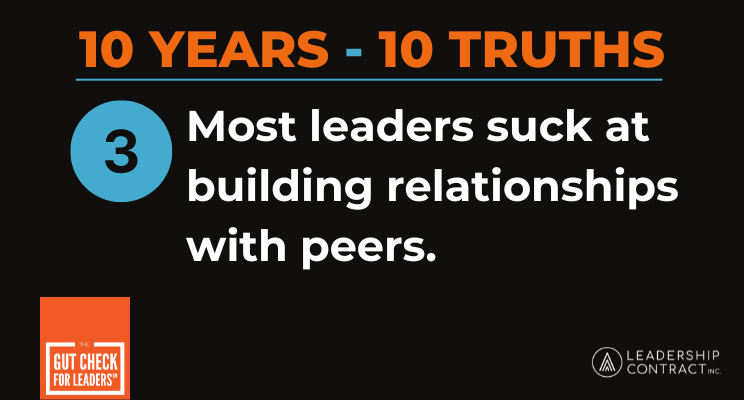3: Most Leaders Suck at Building Relationships with Peers
Here’s the third post in my 10 Years – 10 Truths series. I’m going to reflect on my decade of helping leaders and organizations scale strong leadership accountability.
If you need to get better at building relationships and a great sense of community at work, then check out my ebook: Building Community in a Hybrid World
Over the years, my teams and I have spent a lot of time working with extended leadership teams, which usually represent the top two levels in an organization.
Often, when we gather these teams together, leaders admit that they don’t really know their peers in the room.
Personally, I’m always a bit confused by this. These leaders are putting in a ton of hours leading their companies. They are all on the hook to deliver several significant strategic priorities. Intellectually, they all know they need each other to be successful, yet in many ways they are strangers.
I ask them, “How can a group of strangers effectively lead this company and drive strategy execution?”
The question is followed by silence. They all know that they would be much more successful if they had stronger relationships, but the talk doesn’t translate into action.
Why is this so challenging for so many senior leaders?
There is a common misconception that senior leaders always excel at all things leadership, including building relationships. However, the reality is that many leaders struggle with this aspect of leadership. To put it more bluntly, they downright suck at it, and our companies pay a price.
Many leaders struggle with loneliness, which makes a tough job much harder than it needs to be.
A research study reported in the MIT Sloan Management Review found that 76% of senior leaders said they had difficulty making connections with their work teammates, and 58% felt their social relationships at work were superficial at best.
Our own recent research confirms that leaders at all levels admit to having a hard time forming strong relationships with their peers.
We all pay a huge price for these struggles. For example, research shows that a lack of social connection at work can have serious consequences, including health problems, diminished performance and creativity, and impaired decision-making.
Being a leader is hard enough. Having to deal with the health ramifications of loneliness and a lack of relationships on top of everything else leaders are dealing with is just stupid.
Why does this happen?
Here’s what I’ve learned. First, leaders are often heads down and focused on achieving their goals and objectives. This can make them come across as distant or aloof.
Some leaders may not have the necessary interpersonal skills to build strong relationships. This can include things like active listening, empathy, and effective communication, all of which are vital for building trust and rapport with others.
Some leaders are simply hypercompetitive – they see their peers as their competition, so they don’t bother forming any kind of relationship.
Now, not all leaders struggle with relationships at work. I’ve seen many successful leaders understand the importance of building strong connections with their team members and prioritize this aspect of leadership. Building better relationships creates a more positive and productive work environment, which ultimately benefits everyone involved. What’s their secret?
It really isn’t a secret. They just make relationship-building a priority. They deliberately identify the relationships they need to be successful. They invest time in getting to know their peers. If relationships become strained, they immediately work to make them better.
But most leaders need to be forced into relationship-building. It’s something we do in our leadership programs. We get senior leaders across the organization working together in ways they haven’t done before. They start forming real relationships. They start learning about and understanding each other as people. We see the impact it has on them and their organization. In fact, our pre-post measures show an average of a 40% increase in leaders feeling more connected to each other, more aligned, and part of a real community of leaders.
What are you doing to prioritize relationship-building and create a more positive and successful work environment for yourself, your peers and your employees?
More Leadership Resources
We have many resources to help you scale leadership accountability across your organization.
Signup for our monthly newsletter with the latest Gut Check for Leaders, Lead the Future Podcast, and other important leadership accountability news.





